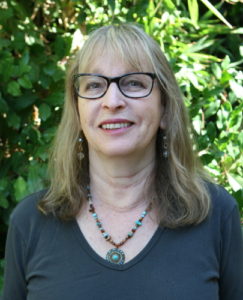 Lori Levy
Lori Levy
Good morning, everyone – and welcome back to winter, after the brief spring fling we had last week here in the northeastern U.S. And now we see that you across Europe are having a “beast” of a snowstorm, the likes of which you have seldom seen. Congratulations – or something!
Nevertheless, we go on with poetry, and our poet today is Lori Levy, who now lives with her family in a multi-generational home in Los Angeles, California, but tells us that “home” for her has also been Vermont and Israel. This is the kind of geographical and cultural background that enriches her poems, which have appeared in many literary journals and anthologies in the U.S., England and Israel. Her poems have also been published in medical and medical humanities journals, such as JAMA and The Examined Life Journal, in a psychological journal, Psychological Perspectives, as well as the anthology recently published by IP Books, Climate of Opinion: Sigmund Freud in Poetry. One of her poems was also read on BBC Radio 4.
It’s with pleasure that we give you the three poems below by Lori Levy.
—Irene Willis, Poetry Editor
IN THE TWIST OF YOUR FINGERS
The psychologist on TV is talking about happiness.
How all we need, really, is a
hot shower in the morning; sometimes just
a stretch, a movement: a body in tune with itself.You know what he means:
not diamonds or a million dollars,
but maybe a rose opening in a vase,
a tree with a head full of orange leaves,
lemon and garlic on fish or greens.
You know how it feels:
like driving on the freeway at night
as you sing love songs with the radio,
your voice perfect in the closed space of the car.
Like a sudden touch: arms coming from behind
to embrace you at the kitchen sink. And
you know he wouldn’t be talking
if it were always there
in the twist of your fingers,
in the turn of the tap.
If it wasn’t more than a rose, a tree, a song.
If it didn’t all depend on
old movies playing between your ears.
MIND OF HER OWN
The baby knows what she wants.
Not the banana I try to feed her in the park,
but the leaf on the grass. The dead one,
brown and crumbling. With a no, no, no,
I pull her hand from her mouth again and again.
We both insist: she’s determined to eat it,
I’m determined to stop her. I take the leaf away,
but, still, she persists, simply shifting her focus
to the next best thing: the button on her sweater,
which, apparently, to her eight-month-old mind,
looks tastier than the fruit I offer.
Later, on the swing, it’s clear what she wants.
There’s a sandbox in front of her. She could watch the kids playing—
that’s what I’d do—but, no, not pails or shovels or digging toddlers;
she twists around nearly backwards to see the action behind her:
mothers chatting, kids laughing, a truck pulling up.
Why is that scene more interesting? Why there, not here?
I don’t know, but she does.
Just a baby on a swing in the park,
but already she’s voting. Ruby knows what she wants.
In this post-election time when we’re all so angry,
I’m grateful the choice is between banana or leaf,
sandbox or truck—but who can say
what begins on the playground?
All I know is this moment: she smiles, I smile,
we respect each other’s vote.
LONELINESS
“You don’t know what it’s like,” she says,
as if it’s a cave I’ve never entered
and she alone has felt its chill;
as if it’s a cape, thick and black,
that comes in sizes that fit the
figures of singles only—
one that my husband could sweep off me
and hang, as a waiter could,
on a hook in the corner.
As if there’s a human alive
who hasn’t huddled in that cave
or cloak, stranded
in a place where no one knocks.
